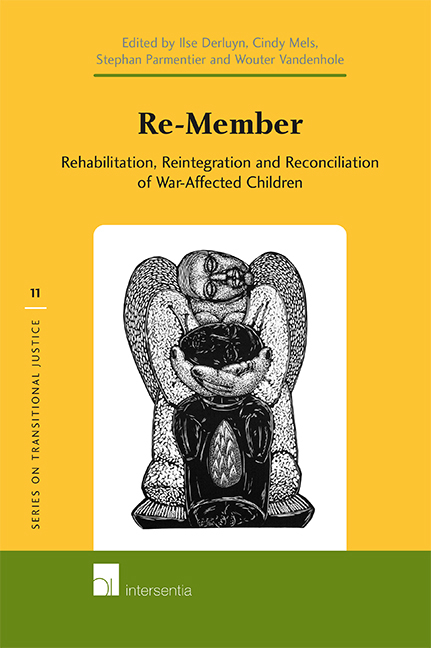Book contents
- Frontmatter
- Preface
- Foreword
- Contents
- Introduction: Children Affected by Armed Conflict at the Intersection of Three Fields of Study
- PART I SETTING THE SCENE: THREE DISCIPLINARY PERSPECTIVES
- PART II LESSONS LEARNT FROM CURRENT PRACTICES AND APPROACHES
- PART III EXPLORING RESOURCES THROUGH EMPIRICAL RESEARCH
- PART IV LOOKING BACK, REACHING FORWARD
- About the Editors
- About the Authors
13 - Life in Rebel Captivity and its Challenges for the Psychosocial Rehabilitation and Reintegration of Former Child Soldiers: The Case of Northern Uganda
Published online by Cambridge University Press: 20 January 2021
- Frontmatter
- Preface
- Foreword
- Contents
- Introduction: Children Affected by Armed Conflict at the Intersection of Three Fields of Study
- PART I SETTING THE SCENE: THREE DISCIPLINARY PERSPECTIVES
- PART II LESSONS LEARNT FROM CURRENT PRACTICES AND APPROACHES
- PART III EXPLORING RESOURCES THROUGH EMPIRICAL RESEARCH
- PART IV LOOKING BACK, REACHING FORWARD
- About the Editors
- About the Authors
Summary
INTRODUCTION
CHILD SOLDIERING IN NORTHERN UGANDA
In northern Uganda, a civil war has been waging for more than two decades between the rebel faction Lord's Resistance Army (LRA) and the Ugandan Government. Although, the roots of this conflict reach back to the colonial era and the conflict has known many episodes; an intensification occurred when Yoweri Museveni, president of Uganda, seized power in 1986 and Joseph Kony, leader of the LRA, set up his guerrilla campaign.
The battlefield of this conflict is situated in the northern districts of the country, where the Acholi population resides. The LRA adopted various civiliantargeting strategies from a political and operational aim, resulting in numerous civilian casualties. Attacks on villages, the maiming of civilians, ambushes, massacres and other atrocities were countless during this emergency. It is estimated that over a million and a half had to flee their homes and reside in internally displaced persons camps4 and that thousands of children sought protection as night commuters in town each night. Furthermore, the conflict limited their access to security, food, employment, education and health services.
One of its adopted strategies, mainly targeting children, is the violent abduction and forced recruitment of minors to serve as child soldiers. It is estimated that so far about 25,000 children have been forcibly involved as child soldiers in the LRA. These children are used to empower the LRA by filling its ranks and are thereby actively engaged in the battle against the government and people of Uganda.
In captivity, abducted children live in harsh circumstances, are exposed to several potentially traumatising events and are made perpetrators of atrocities against their own people. There can be no doubt that these experiences affect the child's well-being and development. Research has found that they are psychologically distressing, resulting in high rates of post-traumatic stress symptoms among former child soldiers. These in turn pose serious threats to the long-term rehabilitation and reintegration of the former child soldiers.
- Type
- Chapter
- Information
- Re-MemberRehabilitation, Reintegration and Reconciliation of War-Affected Children, pp. 307 - 328Publisher: IntersentiaPrint publication year: 2012
- 1
- Cited by



